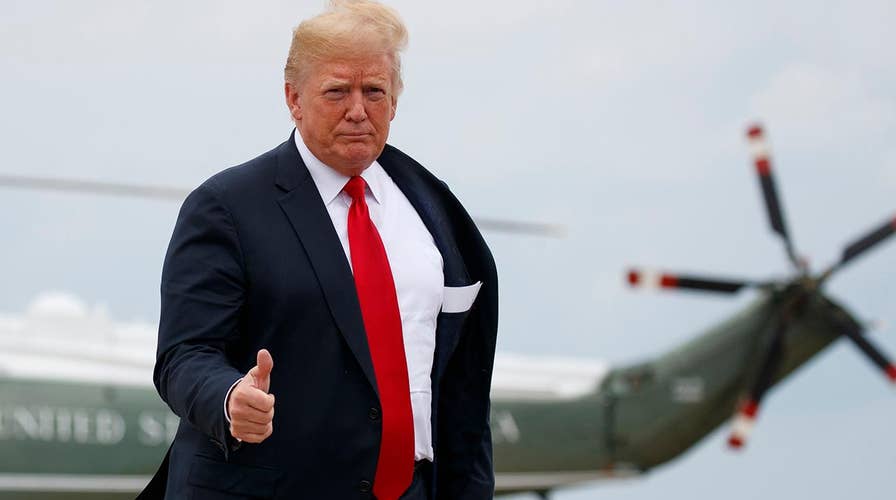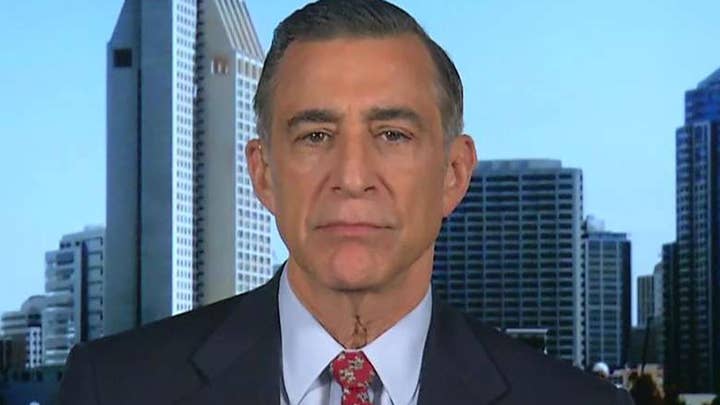Why won't media give Trump credit for booming economy?
Media downplay economic success; Katie Frates of Olympic Media weighs in.
President Trump ripped what he called "haters in the dying newspaper industry" Sunday after the publisher of The New York Times criticized Trump's rhetoric as "not just divisive but increasingly dangerous."
In a rant that took up four separate tweets, the president complained that the media had been "driven insane by their Trump Derangement Syndrome."
"[Ninety percent] of media coverage of my Administration is negative, despite the tremendously positive results we are achieving, it's no surprise that confidence in the media is at an all time low!" wrote Trump, later adding: "The failing New York Times and the Amazon Washington Post do nothing but write bad stories even on very positive achievements - and they will never change!"
Trump posted the tweets a few hours after New York Times publisher A.G. Sulzberger detailed a July 20 meeting between himself and Trump. Sulzberger said Trump's aides had initially requested the meeting not be made public, but added he decided to comment after Trump discussed it in another Tweet earlier Sunday.
"Had a very good and interesting meeting at the White House with A.G. Sulzberger, Publisher of the New York Times. Spent much time talking about the vast amounts of Fake News being put out by the media & how that Fake News has morphed into phrase, "Enemy of the People." Sad!" Trump wrote.
Sulzberger, who succeeded his father as publisher on Jan. 1, said his main purpose for accepting the meeting was to "raise concerns about the president's deeply troubling anti-press rhetoric."
"I told the president directly that I thought that his language was not just divisive but increasingly dangerous," he said.
Sulzberger said he told Trump that while the phrase "fake news" is untrue and harmful, "I am far more concerned about his labeling journalists 'the enemy of the people.' I warned that this inflammatory language is contributing to a rise in threats against journalists and will lead to violence."
Sulzberger, who attended the meeting with James Bennet, the Times' editorial page editor, said he stressed that leaders outside the U.S. are already using Trump's rhetoric to justify cracking down on journalists.
"I warned that it was putting lives at risk, that it was undermining the democratic ideals of our nation, and that it was eroding one of our country's greatest exports: a commitment to free speech and a free press," the publisher said.
Sulzberger added that he made clear that he was not asking Trump to soften his attacks against the Times if he thinks the newspaper's coverage is unfair. "Instead, I implored him to reconsider his broader attacks on journalism, which I believe are dangerous and harmful to our country," he said.
Despite Trump's characterization of the paper as "failing," the Times' ownership company in May reported a 3.8 percent increase in first-quarter revenue compared to the same period in 2017.
The president, who lashes out over media coverage of him and the administration that he deems unfair, has broadly labeled the news media the "enemy of the people" and regularly accuses reporters of spreading "fake news" — the term he often uses for stories he dislikes.
Last week, Trump told hundreds of people attending the annual Veterans of Foreign Wars convention in Kansas City. "Don't believe the crap you see from these people, the fake news," as he gestured toward journalists at the back of the room and the crowd erupted.
He also told them to remember "what you're seeing and what you're reading is not what's happening."
Sulzberger said he accepted the meeting because Times publishers have a history of meeting with presidential administrations and other public figures who have concerns with the publication's coverage of them.
After Sulzberger took charge, Trump tweeted that his ascension gave the paper a "last chance" to fulfill its founder's vision of impartiality.
In the tweet, Trump urged the new publisher to "Get impartial journalists of a much higher standard, lose all of your phony and non-existent 'sources,' and treat the President of the United States FAIRLY, so that the next time I (and the people) win, you won't have to write an apology to your readers for a job poorly done!"
The Associated Press contributed to this report.







